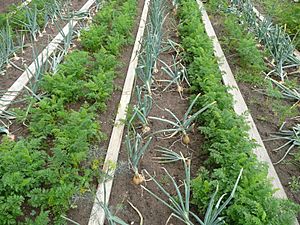Companion planting facts for kids
Companion planting is a smart way to grow plants. It means planting different types of crops close together in a garden or farm. Gardeners and farmers do this to help plants grow better. It also helps them use all the space in their garden or field.
Depending on the plants chosen, companion planting can help in many ways. Some plants can help with pollination. This means they help flowers make seeds. Other plants can help stop pests. Pests are insects or fungi that can hurt crops. Some plants are called trap crops. They attract pests away from the main plants. Other plants can give shelter or shade to nearby crops.
Contents
How Companion Planting Works
Plants can help each other in many ways when grown together.
- Pest Control: Some plants naturally keep harmful insects away. For example, marigolds can scare off nematodes. These are tiny worms that hurt plant roots. Other plants might attract helpful insects. These insects then eat the pests that harm your crops.
- Nutrient Sharing: Some plants can improve the soil for their neighbors. For instance, legumes like beans or peas add nitrogen to the soil. Nitrogen is a key nutrient that helps other plants grow strong.
- Support and Shelter: Taller plants can provide support for climbing plants. They can also offer shade to smaller, more delicate plants. This protects them from too much sun.
- Weed Control: Some plants grow thickly and cover the ground. This can stop unwanted weeds from growing. Weeds compete with your crops for water and nutrients.
History of Companion Planting
People have used companion planting for thousands of years. Many of the basic ideas came from Mesoamerica. This is a region that includes parts of modern-day Mexico and Central America.
About 8,000 years ago, Native American peoples used these methods. They often grew three main crops together: squash, maize (corn), and common beans. This group is often called "The Three Sisters."
- The tall stalks of the corn gave the beans something to climb on.
- The beans helped the corn by adding nitrogen to the soil. This made the soil richer.
- The large leaves of the squash plants covered the ground. This helped keep weeds away. It also kept the soil moist.
This ancient method shows how well plants can work together. It helped people grow healthy food for a long time.
Related pages
Images for kids
-
Shade-grown coffee plantation in Costa Rica. The red trees in the background provide shade; those in the foreground have been pruned to allow full exposure to the sun.
See also
 In Spanish: Asociación de cultivos para niños
In Spanish: Asociación de cultivos para niños
 | Valerie Thomas |
 | Frederick McKinley Jones |
 | George Edward Alcorn Jr. |
 | Thomas Mensah |




